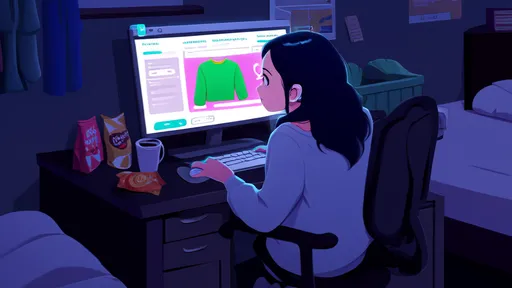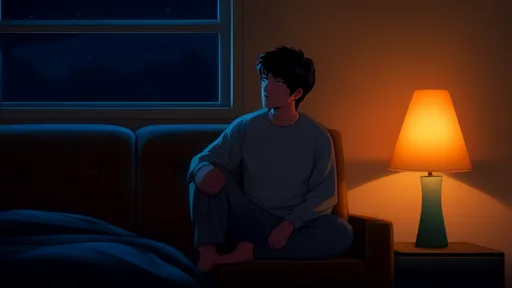Have you ever noticed how your late-night online shopping sprees often lead to questionable purchases? That neon pink sweater that seemed like a great idea at 2 PM suddenly loses its appeal when it arrives at your doorstep. This phenomenon isn't just about questionable taste - it's a well-documented psychological pattern called decision fatigue, and it's quietly shaping our digital consumption habits in surprising ways.
Decision fatigue refers to the deteriorating quality of decisions made by an individual after a long session of decision making. Like muscles that tire after sustained use, our brain's ability to make sound judgments weakens with each choice we make throughout the day. By afternoon, when most people have already made countless micro-decisions - what to wear, what to eat for breakfast, how to prioritize work tasks - our mental reserves for making good choices become dangerously depleted.
The science behind this phenomenon reveals fascinating insights into human cognition. Researchers at Columbia University found that judges are more likely to grant parole early in the day or right after lunch breaks. Similarly, a study published in the Journal of Consumer Psychology demonstrated that people become more susceptible to marketing tactics and make more impulse purchases as the day progresses. Our willpower operates like a finite resource that gets used up, leaving us vulnerable to poor decisions when we're mentally exhausted.
Online shopping platforms have become remarkably adept at exploiting this vulnerability. Their interface designs, recommendation algorithms, and limited-time offers are all carefully engineered to capitalize on our diminished decision-making capacity in the afternoon. The "only 3 left in stock" notification that seems so urgent at 4 PM might not trigger the same panic response in the morning when our cognitive resources are fresh.
What makes afternoon shopping particularly perilous is the perfect storm of biological and environmental factors. Our circadian rhythms naturally dip in the early afternoon, leading to decreased alertness. Combine this with decision fatigue from a morning full of choices, and you have a recipe for impulsive purchases. Many people also shop online during afternoon work breaks when they're already in a distracted state, further compromising their judgment.
The paradox of choice in modern e-commerce exacerbates the problem. Faced with endless options, reviews, and comparison points, our tired brains often take shortcuts. We might fixate on a single appealing feature while ignoring red flags, or we might choose familiar brands not because they're best but because evaluating new options feels too mentally taxing. This explains why afternoon shoppers often report buyer's remorse more frequently than those who shop at other times.
Retailers have turned decision fatigue into a sophisticated science. They know exactly when to send those "abandoned cart" reminder emails (typically in the late afternoon when you're more likely to complete the purchase). They structure their sales pages to minimize need for comparison at key decision-fatigue hours. Some even adjust their recommendation algorithms throughout the day, showing simpler, more emotionally appealing products in the afternoon while reserving complex, feature-rich items for morning browsing.
Understanding this pattern can help consumers develop strategies to avoid afternoon shopping pitfalls. Some experts recommend making significant purchases in the morning or after proper rest. Others suggest implementing a mandatory waiting period for afternoon online carts - if you still want it tomorrow morning, maybe it's worth buying. Recognizing that your afternoon self has different decision-making capabilities than your morning self is the first step toward more intentional consumption.
The implications extend beyond personal finance. As more of our lives move online - from grocery shopping to major financial decisions - being aware of how our cognitive abilities fluctuate throughout the day becomes increasingly important. Decision fatigue doesn't just affect what we buy; it influences the news we consume, the social media interactions we have, and even the political opinions we form in our exhausted states.
In an age where digital platforms are constantly competing for our attention and dollars, understanding the rhythms of our own minds might be the most powerful consumer protection of all. The next time you find yourself adding unnecessary items to your cart in the afternoon, remember: it might not be you making those choices, but a tired version of you that deserves some compassion - and perhaps a break from the screen.

By /Jun 7, 2025

By /Jun 7, 2025

By /Jun 7, 2025

By /Jun 7, 2025

By /Jun 7, 2025

By /Jun 7, 2025

By /Jun 7, 2025

By /Jun 7, 2025

By /Jun 7, 2025

By /Jun 7, 2025

By /Jun 7, 2025

By /Jun 7, 2025

By /Jun 7, 2025

By /Jun 7, 2025

By /Jun 7, 2025

By /Jun 7, 2025

By /Jun 7, 2025

By /Jun 7, 2025

By /Jun 7, 2025

By /Jun 7, 2025